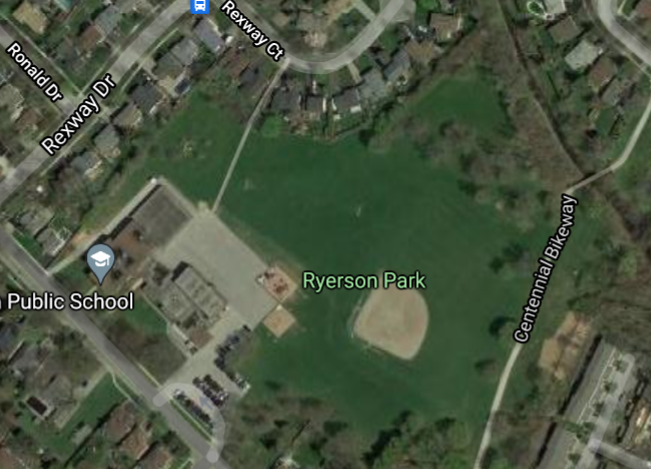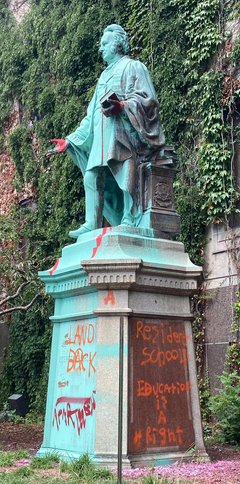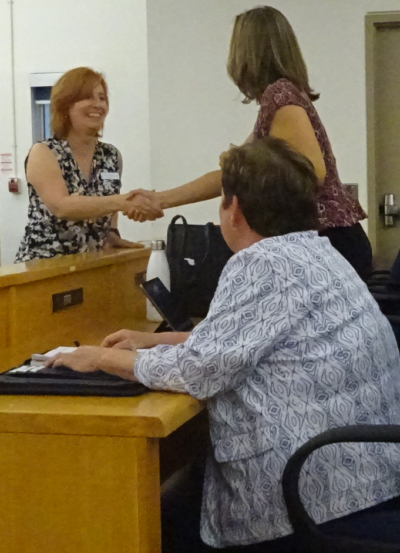 By Pepper Parr
By Pepper Parr
November 5th, 2021
BURLINGTON, ON
The park currently known as Ryerson Park at 565 Woodview Rd. will be renamed to reflect the City’s current naming policies for City assets.

The park is tucked in behind the school.
Between Aug. 24 and Sept. 11, residents were invited to suggest a new name consistent with today’s standards. The name submission portion of this project is now closed and a small working group of City staff, Indigenous Leaders and community stakeholders have created a short-list of names that residents can now vote on.
Staff will take the voting results and report back to Burlington City Council with a recommendation for a new name early in the new year.
Voting is open now at and will be open until Nov. 19, 2021.
Shortlist of Names
More than 500 names were submitted in phase 1.
The Shortlist Committee has considered all the names and chosen three names.
A fourth naming option has been added from Indigenous Elder Stephen Paquette after consulting an Indigenous linguist: Sweetgrass Park.
Sweetgrass is one of the sacred medicines to many First Nations. It is used as a purification medicine in ceremony to purify ourselves and to heal.

For years the contribution Edgerton Ryerson made to the creation of the public educational system we have today was held in great esteem. Public sentiment changed when hundreds of graves were discovered at residential school sites, which were built long after Ryerson had passed on. His statue was defaced and then toppled.
The proposed park names and rationale:
• Head of the Lake Park: This name was chosen to reflect the name of the current land agreement in place that allows settler communities to occupy the location of the park in question, as per the Mississaugas of the Credit First Nation.
• Unity Park: When forms of hatred and attempts to divide people are on the rise we need to find ways of expressing what we think is important. Unity means that we embrace our differences, that we value other people’s experience and beliefs
• Truth and Reconciliation Park: To heal as a nation we need to speak the truth and reconcile our relationship with the Indigenous peoples of Canada.
• Sweetgrass Park: Sweetgrass is used as a purification medicine in ceremony to purify ourselves and to heal.
Why are we renaming Ryerson Park?
At the June 16, 2021 meeting of the Halton District School Board (HDSB), trustees unanimously approved a motion to rename Ryerson Public School on Woodview Road in Burlington, in accordance with the Board’s Naming and Renaming Schools Policy and Governance Procedure.

Mayor Meed Ward meets with Andrea Grebenc, Chair of the Halton District School Board
As part of the Board motion, the Chair of the Board sent a letter to inform the City of this decision. Burlington City Council then unanimously voted to rename Ryerson Park. This was done out of respect for Indigenous residents in our community, particularly following the recent discovery of mass graves at former residential schools.
Burlington’s Ryerson Public School, and adjacent Ryerson Park, are named after Egerton Ryerson for his contributions to the Ontario education system, however, Ryerson was also instrumental in the design of Canada’s residential school system. In 2015, the Truth and Reconciliation Commission of Canada concluded this assimilation amounted to the genocide of Indigenous people.
Burlington Mayor Marianne Meed Ward explains: “Earlier this year, Burlington City Council unanimously voted to rename Ryerson Park, in line with the recent HDSB decision to rename the adjacent school. This was done out of respect for Indigenous residents in our community and visitors to our city — particularly following the recent discovery of mass graves at former residential schools.



















I read with great interest some of the perspectives put forward and so thank those for sharing them. I realize how the process of decolonizing our world is painful to some people, it creates discomfort, which as humans we don’t like. No one, myself wants to demonize Ryerson and I can certainly acknowledge his contributions to society. However there is a difference between acknowledging an individual and idolizing someone, putting them on a pedestal. That is the difference. One can certainly find many people praising Ryerson, however those perspectives come from a purely Eurocentric perspective, which we have been led to believe is the absolute and only truth, like residential schools were a good thing. Have we woken to that reality?If realizing that means being WOKE, then consider many people in today’s society as wide awake as opposed to the gently sleeping society we once were. I like the suggestion of Dr. Bryce however that once again promotes the history of colonization, that being the Eurocentric belief that a white European culture is always bringing society forward. I believe in the value of not naming parks after individuals, idolizing them without knowing their full impact on history.
Sweet grass is a healing medicine, it speaks to the power of coming together in Unity, Aubrey someday, we all get there together.
Thank you for your comment and perspective.
But I have to ask why does the name seemingly have to have an indigenous connotation?
Why not something, as offered here earlier, neutral like Trillium or Maple?
Phil, totally agree with you. There is no reason to change the name of the school or the park. Anyone who has looked into the life of Egerton Ryerson knows that he is not the villain this WOKE society we find ourselves surrounded by thinks he is.
In Burlington, especially with this council, it is JUMP on anything that looks like it could be looked at as being socially aware. A council that informs its residents would have looked into this and corrected the wrong that has been put onto Egerton Ryerson, and acted accordingly.
The one thing this council does not seem to be able to do is to take responsibility and correct an error made by them. Not only on this issue.
As I have commented in other venues, this whole renaming project amounts to a lynching of Egerton Ryerson by a well-meaning but otherwise uninformed social media lynch mob. Will the City reveal how many votes were received from people like me, who voted for the name “Ryerson Park”?
What an upside-down world we live in. I would be in favour of removing Ryerson’s name if he were responsible for the travesty that was the residential schools. Here we are censuring Egerton Ryerson by removing his name from a school and a park for his role in the residential schools. One small detail–Ryerson based on the historical record played no part in the formation of the residential schools. The TRUE historical record was noted by Lyn McDonald, professor emerita at the University of Guelph, former NDP MP, member of the Order of Canada, and a Fellow of the Royal Historical Society and was published in the National Post and elsewhere: https://financialpost.com/opinion/lynn-mcdonald-the-historical-record-vindicates-egerton-ryerson
At the same time, we also see the name of Joseph Brant proudly displayed on our hospital and in a museum–Joseph Brant was the documented owner of between 30 and 40 black slaves. We also see the name of Craig Kielburger displayed on a school but this is the same person who is the subject of a trial for fraud and documented for illegal lobbying. And yet in the case of these latter two individuals, there is no move afoot to censure them.
However, if we are to rename these two parts of Burlington, may I suggest we dedicate them to Dr. Peter Bryce. Dr. Bryce, the Chief Medical Officer, for the federal government, was the first “whistleblower” on the residential schools. In 1907, he reported that 25% of aboriginal children were dying of TB due to unsanitary conditions. He advocated for changes to be made but the Laurier government and the subsequent Borden government ignored him and deadended his career. In 1922, he published a pamphlet about the schools called “The Story of a National Crime”–again he was ignored. Previous to his work for the federal government, Bryce had an exemplary career in public health for the Province of Ontario.
Great suggestion.
I noticed there were no neutral options such as Trillium